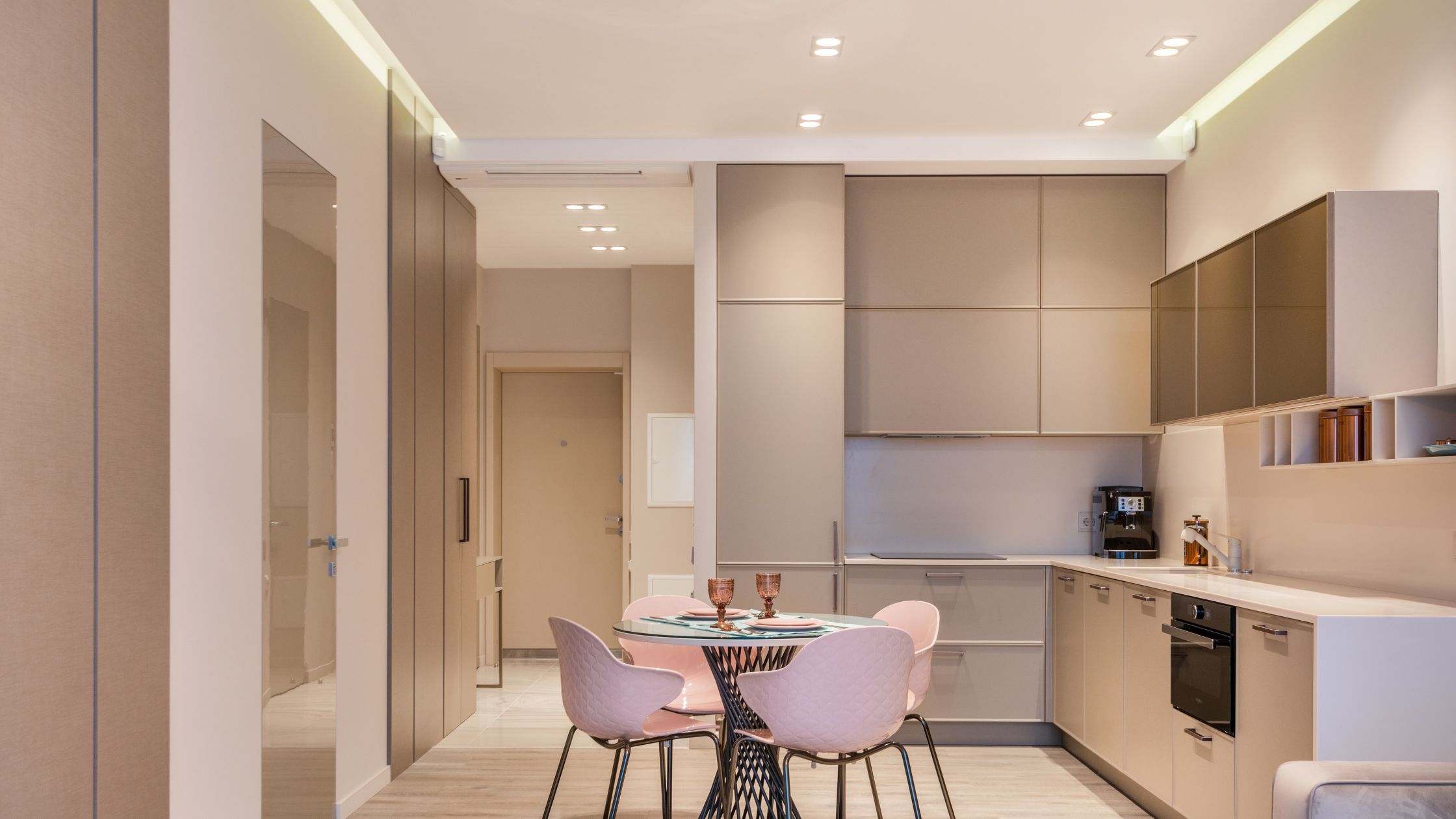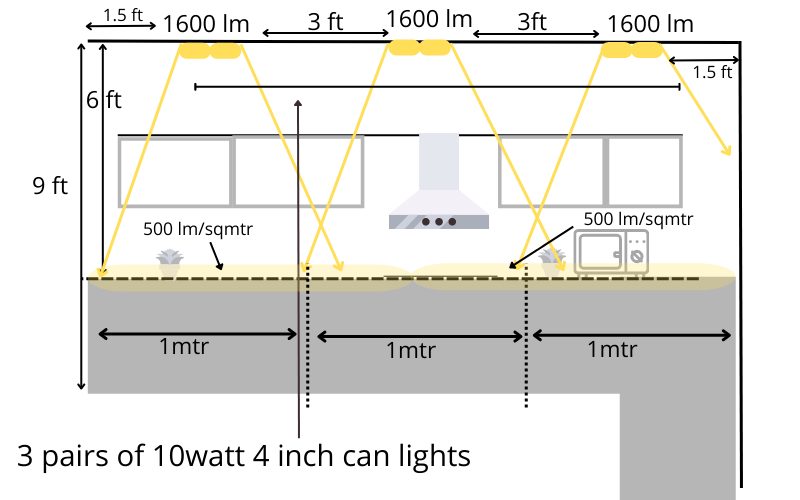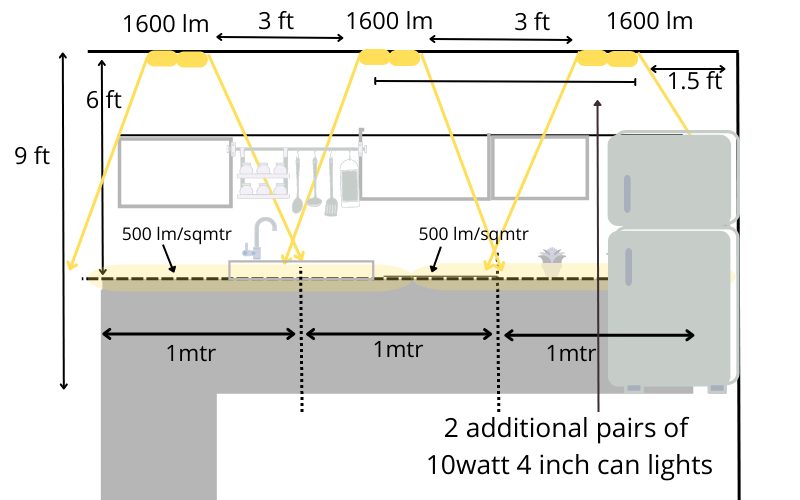Can lights are widely used light sources to illuminate kitchen but its quite easy to easily go wrong in determining how many of them are actually required and how to layout them elegantly. In this post, I have explained every aspect of can lights in detail especially for a 10×10 kitchen.
To properly light the task areas of a 10 ×10 kitchen with an average height ceiling, 8 (4 inches – 8 watt) can lights or 4 (6 inches 12 watt) can lights are required whereas for general illumination, 8 ( 4 inches 10 watt ) or 4 (12 watt 6 inches) can lights are required.
Furthermore, the number of can lights required may vary depending upon the height of the ceiling of kitchen.
The tables below show the accurate number of can lights required for task lighting and general lighting based for 10 x 10 kitchen with different ceiling heights.
no. of can lights for general illumination in 10 x 10 kitchen
| ceiling height | total lumens for general ligting from the ceiling | no. of can lights required |
|---|---|---|
| 8 ft | 4800 lumens from ceiling in total | 8 (4 inch 8 watt) or 4 (6 inch 12 watt) can lights. |
| 9 ft | 6400 lumens from ceiling in total | 8 (4 inch 10 watt) or 4 (4 inch 8 watt) + 4 (6 inch 12 watt) = 8 can lights. |
| 10 ft | 8000 lumens from ceiling in total | 8 (4 inch 12 watt) or 8 (6 inch 12 watt) can lights. |
It may be noted that for general illumination in kitchens with higher ceilings i.e (11 ft and above), a combination of recessed lights along with other light fixtures should be used else the entire ceiling gets covered by can lights and gives a monotonous look.
Such a look favors kitchen without islands, however kitchen with an island needs another light source along with can lights to fulfill general lighting requirement.
No. of can lights for Task lighting in 10 x 10 kitchen
| Ceiling height | Total Lumens for task lighting (if can lights are to be placed on ceiling) | No. of can lights required |
|---|---|---|
| 8 ft | 6000 lumens in total from ceiling | 10 (4 inch 8 watt) or 6 (6 inch 12 watt) can lights. |
| 9 ft | 8000 lumens in total from ceiling | 10 (4 inch 10 watt) or 10 (6 inch 8 watt) lights. |
| 10 ft | 11000 lumens in total from ceiling | 10 (4 inch 12 watt) or 10 (6 inch 10 watt) lights. |
| 11 ft | 14500 lumens in total from ceiling | 15 (4 inch 12 watt) or 15 (6 inch 9 watt) lights. |
| 12 ft | 18000 lumens in total from ceiling | 20 (4 inch 12 watt) or 15 (6 inch 9 watt) lights. |
YOU MIGHT ASK –
The number of can lights required for general lighting in kitchen is almost same as the number of can lights required for lighting task areas in kitchen. How is that ?
The simple answer is that in task lighting, the distance of light source from task areas is less compared to general lighting in which the distance is measured from ceiling to floor whereas in task lighting the distance is measured from ceiling to the countertops.
Also, there are other factors like lumen flux required at countertops is different than the lumen flux required on the floor. When all these factors are considered together, the number of can light required at a particular spot is determined.
How many can lights for undercabinet task lighting in 10×10 kitchen
For illuminating task areas from under the cabinet, 5 (4 inch 8 watt) can lights are required. Here’s how,
Since the recommended lumens for task lighting in the kitchen is 500 lm/sqm and the distance between the countertop and upper wall cabinets is only 1.5 ft (18 inches). This much of small distance does not allow much loss in brightness to occur.
Given the length of entire countertop in a 10*10 L-shaped kitchen is 5 meters and if a single 8 watt can olight provides around 650 lumens of brightness. This means 5 (4 inch 8 watt) can lights are enough to get task lighting.
Calculations
The number of can lights required is different for illuminating kitchen task areas and different for general illumination.
For lighting task areas
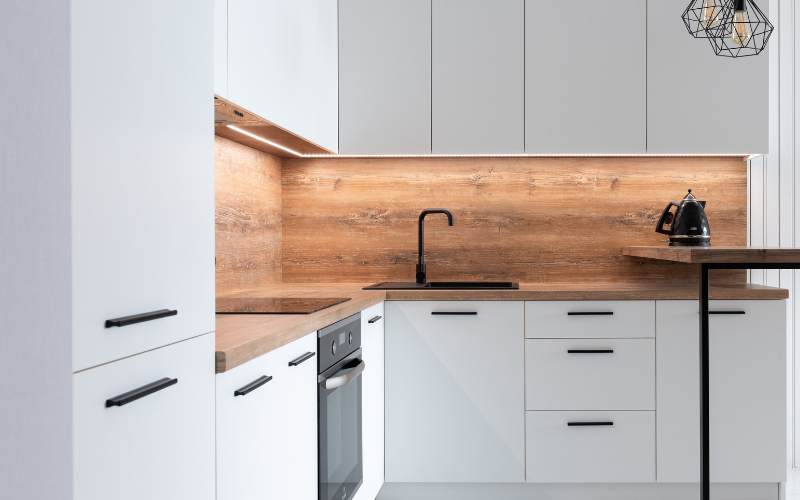
The lighting requirement for task areas like countertops and sink is high (55 -75) lumens per sq feet that’s roughly equal to 500 lumens per sqm compared to general lighting in the kitchen.
To find how many can lights are required for task lighting in a 10×10, measure the total sq. feet area of the countertops then after converting that value into sqm , multiply the area of kitchen countertops (in sqm) with 500. This will give the appropriate brightness for can lights for the ceiling and thus after knowing the required brightness, the number of can lights required can be easily found.
For example in a 10×10 kitchen with 8 feet ceiling height, if the total square meter area of the countertop is 3.5 sqm then the number of can lights required for task lighting will be 10 (four-inch can lights) each having 8w power usage or 5 -6 (six inch can lights) each of 12w power.
For general lighting
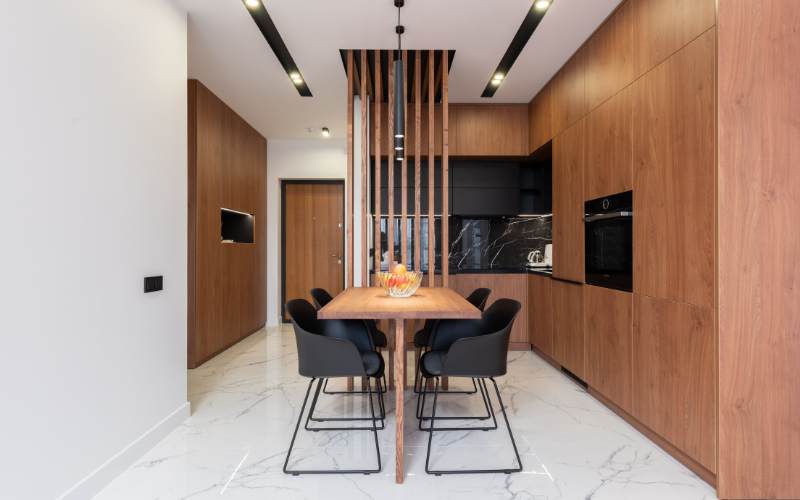
The lighting requirement for general illumination of a kitchen is low (20-30 lumens per sq feet or 200 -300 lumen per sq m) compared to task areas.
To calculate how many can lights are required for general illumination in a 10×10 kitchen, multiply the total sqm area of the kitchen by 200.
This gives the required number of lumens for general illumination. After finding the right number of lumens, the number of can lights can be easily found by looking at their lumen output.
For example, if the total lighting requirement for general illumination is 4000 lumens, then by simply looking at the lumen output label of can lights at a particular wattage, the correct number of can lights can be calculated.
Some important factors that also determine how many can lights are needed for a 10×10 kitchen
Ceiling height
Light follows an inverse square law which means the intensity of light is inversely proportional to the square of the distance between the light source and object.
In simple terms, the intensity of light keeps on decreasing as we move away from the light source. The same light source that provides sufficient brightness from an 8 ft high ceiling may not provide sufficient brightness from a ceiling height of 9 ft.
Therefore, as the ceiling height increases, more can lights are needed to fulfill the lighting requirement both for task lighting as well as general illumination.
presence of Island
The presence of an island within the kitchen decided how many can lights can actually be installed. Covering the entire ceiling with can lights is not an option in a 10×10 with island.
Island needs specific light sources to enhance the overall look of kitchen as well as to fulfill lighting requirement. Most of the time, can lights are used along with a different light source to illuminate the island.
Having calculated how many can lights are required in a 10×10 kitchen, now let’s see how to layout can lights to get maximum illumination from them while maintaining the aesthetic appeal of the kitchen.
Can lights layout for 10×10 kitchen
Layout for task lighting
1. For kitchen with 8 ft ceiling
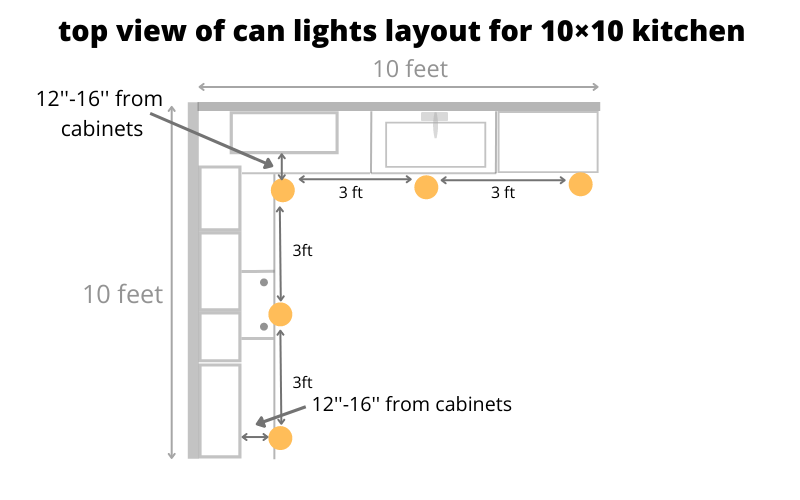
The layout above is a top-angle view of can lights illuminating task areas of 10×10 kitchen with 8 ft ceiling. The can lights are placed at a distance of 12″-16″ away from the cabinets.
In the above graphic, only a single unit of can lights are shown. However, if single units are not providing sufficient brightness then multiple can lights are utilised.
To give an idea of how actual layout would look see the image below.
The layouts above shows can lights placement for both sides of an L shape kitchen countertops.
2. For kitchen with 9 ft ceiling
kitchen task lighting 9ft
In the above layouts, 5 units of can lights are used each unit is composed of 3 (10 watt 4 inch) can lights placed at a distance if 2 feet from the wall, 12″ from cabinets and there is a gap of 1.5 feet among each unit.
3. For kitchen with 10 ft ceiling
For a 10×10 kitchen with 10 ft ceiling, 2 (12 watt 6 inch can lights with 1 8 watt 4 inch can light is placed together as a unit to get an illumination of 700 lm/sqm at the countertops.
Each unit is placed 12″ away from the cabinets with a gap of 0.6 ft between two successive can lights unit.
4. For kitchen with 11 ft ceiling
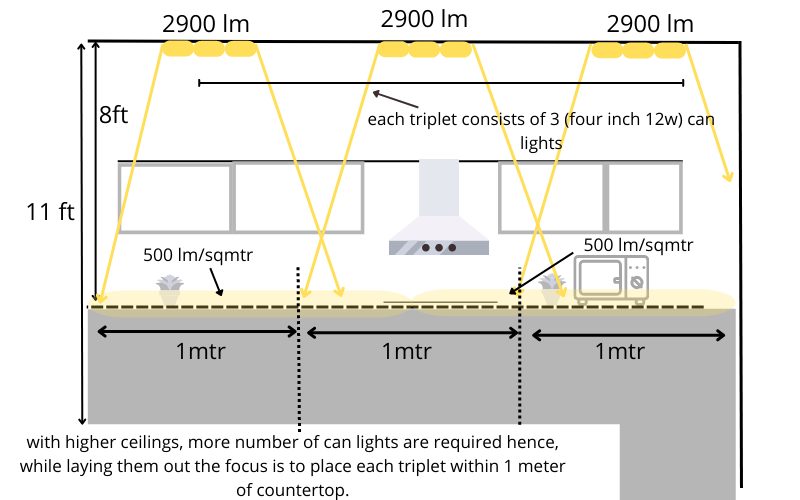
When the height of ceiling increases, the focus of laying out can light is to get 500 lm of light in one sq m area. Hence, the entire length of the countertop is divided into three 1 m parts. Such that each part receives proper illumination for tasks.
In this case, each unit of can light consists of 3 (4 inch 12 watt) can lights.
5. For kitchen with 12 ft ceiling
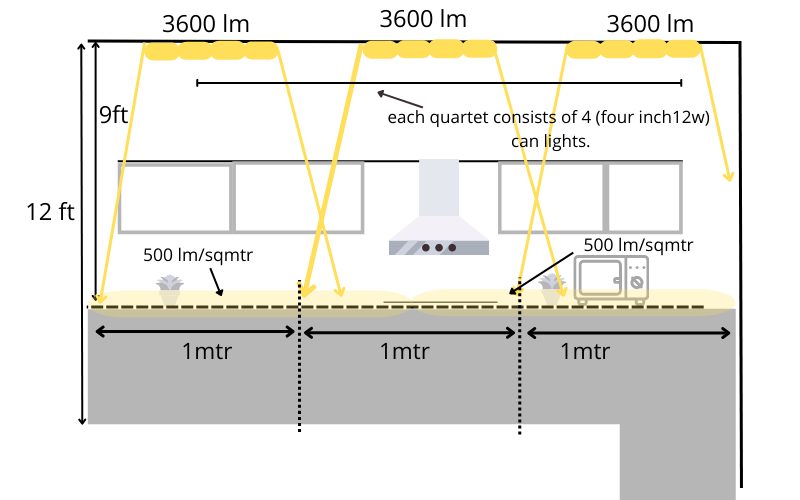
With 10×10 kitchen with 12 ft high ceiling, layout is designed to fulfill the need of task lights i.e to get 500 lumens in 1 sqm area. For this a quartet of 4 (4 inch 12 watt) can light is placed within 1 m area of countertop.
For General Illumination
general illumination can light layout for 10×10 kitchen with 8 ft ceiling
While laying out can light for general lighting in a 10×10 kitchen, the first step is to divide the entire sqm area of the kitchen into 9 identical squares. Afterward, each can lights unit is placed in specific squares to fulfill the lighting requirement.
See image below for the layout. Each pair of can lights is placed at a gap of 3.3 feet from each other while a distance of 8″-12″ is kept from the wall.
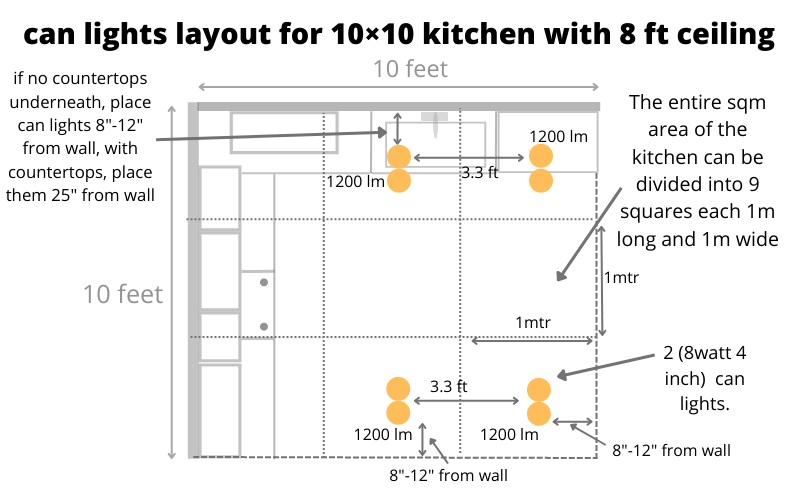
The pair of can lights can be placed either upwards or sidewards as shown in the image below.
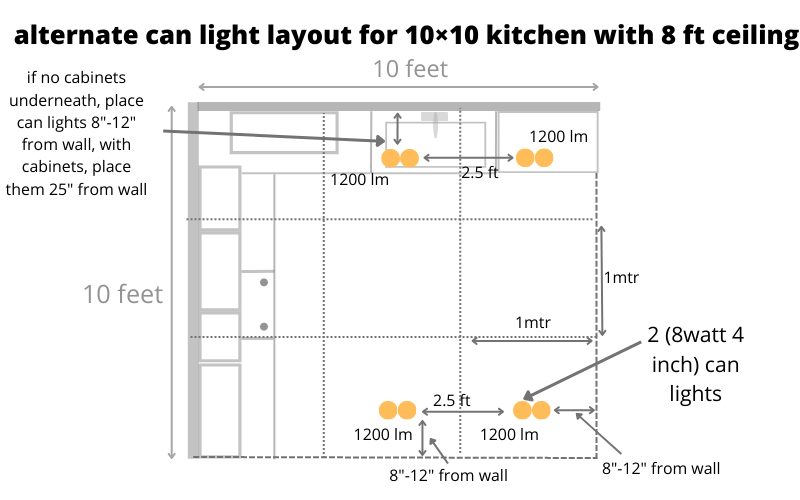
For kitchen with 9 ft ceiling
While laying out can lights for the general illumination of a 10×10 kitchen with 9 ft ceiling, can lights are placed in pairs such that each pair consists of 2 (4 inch 9 watt-10 watt) can lights.
A gap of 2 feet is kept between two adjacent triplets while a distance of 8″-12″ is maintained from the wall.
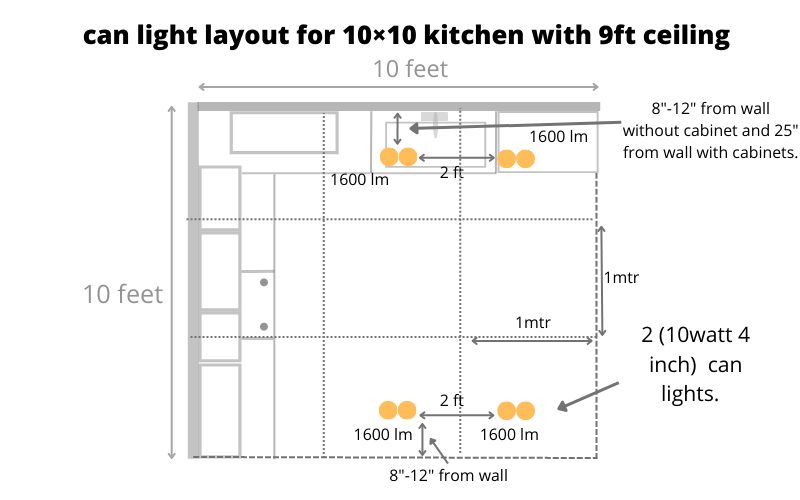
For kitchen with 10 feet ceiling
In the layout below, can lights are used in pairs. Each pair consists of 2 (10 watt 4 inch) can lights. A gap of minimum2 feet is maintained between two adjacent triplets.
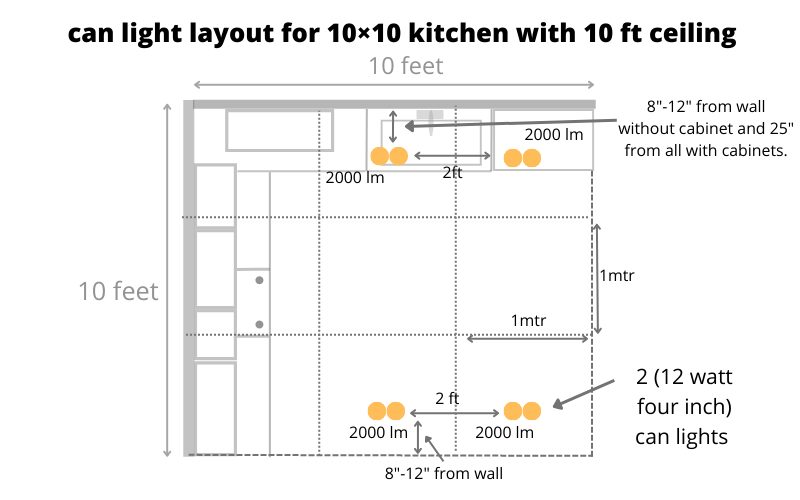
Kitchen with ceiling 11 ft and above.
With higher ceiling, the brightness required from light source increases thus it is a good practice to incorporate other light fixture with can lights to meet the lighting requirement.
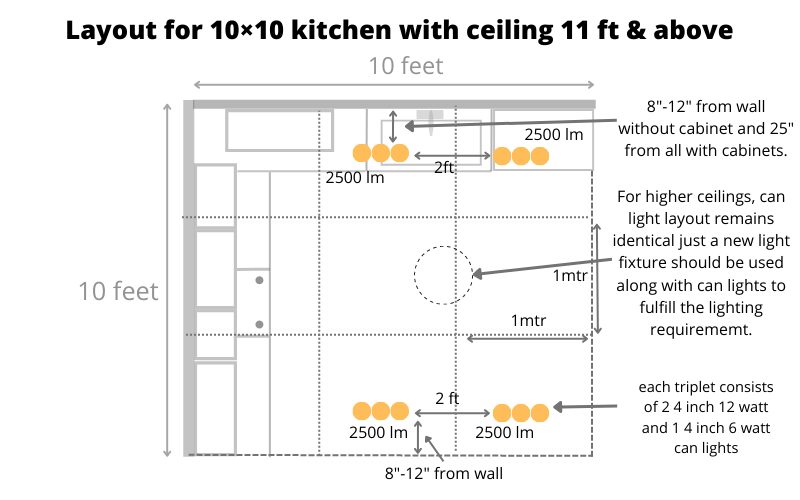
can the layout for task lighting and general lighting be mixed together?
Lighting experts recommend that there should always be a variety in the use of light sources. This means if can lights are used for task lighting some other light source should be preferred for general lighting and if can lights are used for general lighting then some other light source should be used for task lighting.
Having said that, these can lights layouts are designed in such a way that they can be used together to fulfill the need for task lighting as well as for general illumination.
